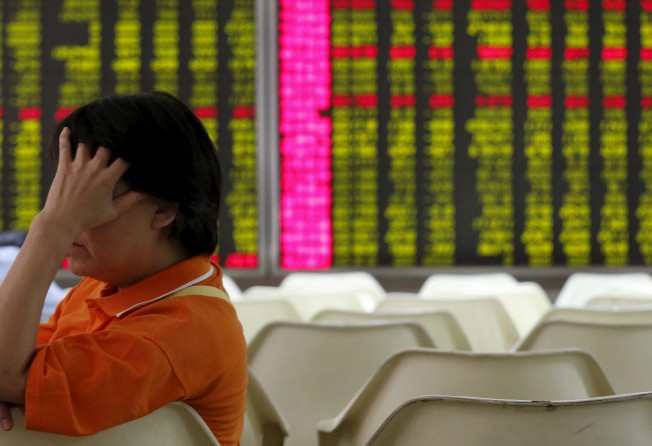China’s stock market crash fuels economic uncertainty
Analysts warn of risks from slowdown in policy reform and mounting local government debts

Crashing stock markets do not automatically lead to a depression. On Black Monday in 1987, US stocks plunged 22.6 per cent, but the economy still saw more than 3 per cent growth that year.
“The China stock market crash, which at one point erased US$3.3 trillion in market value, and the ensuing massive intervention by Chinese policymakers to support the market, have engendered major uncertainties, and the A-share market remains very volatile,” George Hoguet, an investment strategist with US consultancy State Street Global Advisors, wrote in a recent report.
“Risks are to the downside, but at this juncture there is still insufficient evidence to reject the consensus view that China will grow in the next six months at an annualised rate of at least 6.25 per cent.”
Klaus Baader, the chief economist of Societe Generale Economics Asia, said other analysts felt growth could slow further to about 5.5 per cent by 2019, adding that the booming financial sector that contributed to the unsustainable bull market earlier this year was unlikely to be maintained.
Hoguet said the biggest risk the mainland economy was facing was probably a slowdown in its policy reform and growing fragility of financial services firms that might lead to a panic.
Others worry mounting debts, particularly from local governments, might trigger systemic risks that could spill over to the macro economy and even disrupt the regional or world economy.
But some highlight a strong national balance sheet and rising services sector as factors that will soften the free fall.
“The Chinese Academy of Social Sciences estimates the debt-GDP ratio in China stood at 214 per cent [last year],” said Francis Cheung, the head of China-Hong Kong strategy at CLSA. “If we net the total government debt against total financial assets, the government would be net positive with financial assets of 6.8 trillion yuan (HK$8.26 trillion). It would already be net positive just netting out readily available assets such as foreign reserves, gold reserves and sovereign wealth fund holdings.”
The government certainly does not want to see the financial intermediaries fail. Since June 27, it has investigated a few brokerages for market manipulation, while providing liquidity to the China Securities Finance Corp, which supplies loans to securities firms for margin financing.
But such heavy intervention also makes the financial system less transparent and reinforces the view among outsiders that the country’s stock market is more policy-driven. Besides, lending to financial intermediaries to stabilise the market might crowd out investment demand for the real economy, analysts from China International Capital Corp said.
Hoguet said mainland share “prices are substantially distorted by government intervention”.
“Given that the price discovery mechanism is non-market driven, and that leverage in the system is still significant, investors may want to analyse carefully their entry point into the market,” he said.
Politically, the market sell-off has disrupted President Xi Jinping’s plans to liberalise the economy. However, he seems determined to pursue that agenda.
“The crash, however, will strengthen the hand of those factions who favour a more gradual transition to a market economy and slower liberalisation of the capital account,” Hoguet wrote.
Additional reporting by Xie Yu